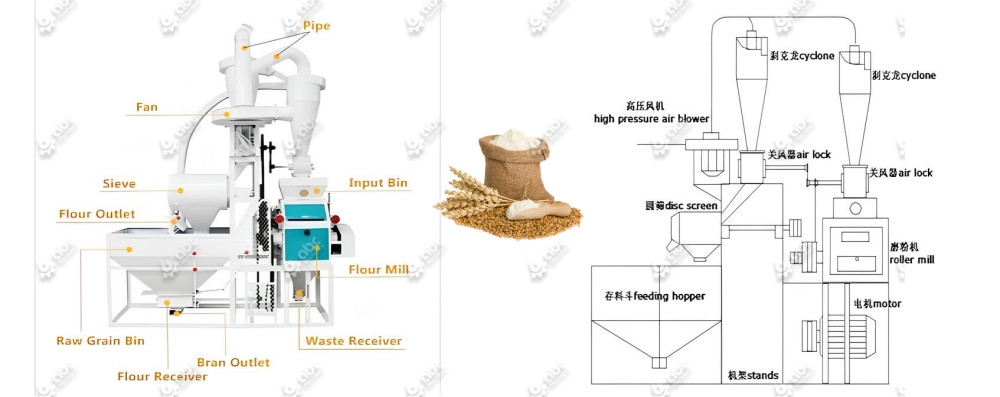
Mini Flour Mill Business Requirements Pakistan
Establishing a mini flour mill business in Pakistan requires a thorough understanding of market demand and strategic location selection. The annual flour consumption in Pakistan exceeds 10 million metric tons, with over 60% processed by small and medium-sized mills. This indicates robust potential for localized flour mill in Pakistan operations, particularly in Punjab and Sindh regions where wheat availability is abundant.
Domestic consumption patterns show that household flour demand accounts for 70% of total production, while industrial bakeries and food processors take up the rest. This segmentation means investors can either target retail distribution (5–10 tons/day production) or industrial contracts (20–40 tons/day).

Small Wheat Flour Mill Machines: 10, 20, 40TPD Capacity
Identify your target region early and partner with regional distributors to streamline logistics and optimize operating costs—contact our engineering team to design a localized facility plan.
Setting up a mini flour mill business in Pakistan involves selecting efficient equipment and an energy-optimized process line. A basic flour mill setup of 10–20 tons per day typically includes a cleaning unit, roller mills, sifting system. The goal is to ensure consistent flour quality and minimal energy waste per ton of output.

Launching a mini flour mill business in Pakistan requires following strict legal and regulatory frameworks. Investors must complete registration, obtain operational licenses, and meet food safety standards defined by the Pakistan Standards and Quality Control Authority (PSQCA). Non-compliance may result in penalties up to PKR 500,000 or forced shutdown.
All flour mills operating under Pakistan’s industrial code must register with the Securities and Exchange Commission of Pakistan (SECP) and acquire a trade license from the local Chamber of Commerce. Environmental compliance requires approval from the Provincial Environmental Protection Agency (EPA) under section 12 of the Environmental Protection Act.
| License Type | Issuing Authority | Validity | Typical Fee (PKR) |
|---|---|---|---|
| SECP Industrial Registration | Securities & Exchange Commission | Permanent | 5,000–10,000 |
| Trade License | Local Chamber of Commerce | 3 Years | 7,000–15,000 |
| Food Safety Certification | PSQCA | 2 Years | 25,000–40,000 |
| Environmental Approval | Provincial EPA | 5 Years | 15,000–25,000 |
Food safety certifications ensure product quality and compliance:
A mini flour mill should maintain fire safety equipment every 12 months and conduct air-quality monitoring quarterly. Installation of noise suppression barriers can reduce ambient noise levels by 15–20 dB, ensuring worker safety. Adhering to environmental and safety laws not only guarantees legal compliance but also strengthens investor trust and market reputation.
The total investment for a mini flour mill business in Pakistan varies between PKR 10 million and PKR 20 million, depending on capacity and automation level. Equipment purchases account for around 55–60% of total capital expenditure, while civil construction and utilities setup contribute another 25–30%.
| Cost Category | Percentage | Estimated Cost (PKR) |
|---|---|---|
| Machinery & Installation | 58% | 6–10 million |
| Building & Utilities | 27% | 3–5 million |
| Raw Materials & Labor | 10% | 1–2 million |
| Working Capital | 5% | 0.5–1 million |
A 10-ton/day mini mill can achieve a gross profit margin of 18–22%, assuming stable wheat prices at PKR 120/kg and retail flour selling at PKR 145/kg. Break-even is typically reached within 18–24 months of operation.
flour mill in Pakistan remains a strong investment category with sustainable domestic demand and export potential. A well-planned mini flour mill business in Pakistan—built on efficient machinery, proper licensing, and optimized cost structure—can achieve long-term profitability and market resilience.
Maximize your project’s profitability with optimized plant design and cost forecasting—connect with our financial engineers to develop your tailored investment roadmap.